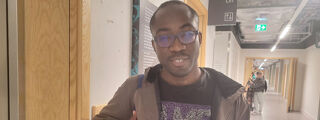Find out about Daniel's first year experience studying Sound Engineering, from overcoming challenges to finding a new passion.
What first drew you to sound engineering?
I was first drawn to sound engineering through my passion for music production. I had already been producing music on my own for a few years, and while I loved the creative side, I reached a point where I wanted to push myself further and really understand the technical foundations. Studying sound engineering felt like the perfect way to develop my craft, giving me the chance to learn not just what to do, but why things work the way they do in professional setups.
Can you describe a project from your first year that really challenged you, and what you learned from it?
The audio software development projects were definitely the most challenging part of my first year, mainly because I had no prior experience with programming. At first, the idea of writing code to manipulate sound felt completely foreign compared to the more hands-on aspects of production. But as time went on, I approached it step by step, and gradually, things started clicking. That process taught me patience, problem-solving, and the value of persistence. By the end, I had not only picked up a new skill but also learned how creative coding can be when applied to sound.
Which piece of equipment or software did you find most difficult to master, and how did you overcome that?
I found SSL consoles and mixing desks quite intimidating in the beginning. There are so many buttons, knobs and signal paths that it can feel overwhelming at first glance. The way I managed to overcome that was through consistent hands-on practice and repetition. The more familiar I became, the more natural it felt, and eventually what once looked complex became second nature. It was a reminder that mastery often comes from putting in the hours and not shying away from mistakes while learning.
Engineering Courses
Find out more about our courses
How has collaborating with classmates on recordings or live setups shaped your learning experience?
Working closely with classmates has been one of the most rewarding parts of the course. Everyone brings their own style, background and perspective, and that diversity really shapes the learning process. Sometimes I’d approach a problem one way, only to see a teammate solve it differently and that sparked new ways of thinking. Collaboration not only improved my technical skills but also taught me the importance of communication and teamwork, both of which are essential in real-world sound engineering work.
How has your idea of what you want to specialise in changed since starting the course?
When I started my course, I only had a vague idea of what area I might want to specialise in. I was open to the idea of studio work but wasn’t entirely sure. Now that I’ve had more exposure to the different aspects of sound engineering, I find myself drawn toward acoustics and audio software development. Both areas challenge me in unique ways and combine creativity with technical problem-solving, so I’m still exploring which path feels like the best fit.
What advice would you give to someone just starting their first year in sound engineering?
My advice would be to keep an open mind. You never know which area of sound engineering you might fall in love with, or which skills you’ll end up valuing the most. Some things may feel intimidating at first, whether it’s complex equipment, new software, or even programming, but if you stay curious and patient with yourself, those challenges will become stepping stones. The first year is as much about exploration as it is about building a foundation.
